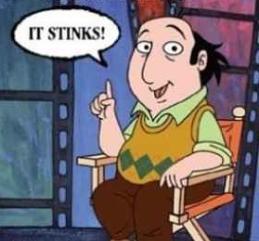
It may seem like all I do is bitch about other articles on here, but I am getting old and cranky. Today’s target, I mean subject is an article from The Chronic{le} of Higher Education by Thomas Doherty, The Death of Film Criticism. Doherty laments the rise of blog film critics on the wild expanses of the Internet that don’t have much to say beyond the trivial by scribes who don’t even read books. He does a good job of describing the rise and fall of film criticism in the 20th. century and it’s worthwhile reading. Where he loses me is how he doesn’t see how utterly predictable this all is. The main target market for films is the youth. That’s not to say older people don’t see movies, but for the most part, they matter far less than the teenager. Why? The blockbuster needs repeat viewings by throngs of theatregoers. So, the medium is increasingly targeted towards teen audiences, along with the current infatuation with celebrity culture. The Hollywood machine caters to the “head” of the long tail, i.e., the blockbuster, which is all about delivering spectacle. It’s not about artistry, how Paul Thomas Anderson’s Magnolia {1999} has umpteen layers of symbolism and references couched within, or what Lars Von Trier and the Dogme95 movement are doing with films like Antichrist {2009}. The rise of the bloggers, who could care less about allusion or auteurs, goes hand in glove with where much of the industry is today. These days it’s about horror, action, and vampires.
Where Doherty gets interesting is how he says the Internet is also spawning interesting intellectual dialectic discussion on film by academics. Unfortunately, such work isn’t weighted the same way as publications, bringing up the issue of how institutional logics lag behind the new technologies. I see this as a big problem for two reasons.
First, while I “get” the idea that peer-review publications and books in journals and presses serve a legitimation function, this same function serves dominant paradigms in fields and places academic knowledge behind paywalls. Should academic knowledge be free? I feel that what distinguishes higher education research from applied industrial research is that it serves the public good, so I feel university knowledge should be towards no or low cost to obtain. Even in the areas of innovation, I believe universities can be a catalyst for “open innovation”, where technologies are licensed to multiple entities at a lower cost structure to spur distributed collaborative work. The idea is to speed up the innovation process by allowing knowledge to flow through networks, not silos {within companies or even departments}.
Second, I think that higher education may be at a crossroads. Right now, it has a monopoly on providing the legitimizing totem of the accredited degree, which has a ceremonial function in the workforce. In 2007, I was at an event where a local employer discussed what skills they are looking for from recent college graduates. What were they looking for? Critical thinking? Domain knowledge? Sure. But what came through as highlights were “meeting” skills and knowledge of Microsoft Office. This made me cringe, as I thought this was a harbinger as the university as merely vocational education.
Nevertheless, I’m wondering if with globalization that higher education needs to be relevant more than ever. Relevant to all of its stakeholders, which may mean a swifter adaptation to changes afoot, in terms of the institutional character of higher education and what it rewards and values. Future blog posts of mine will develop my ideas on this and provide a blueprint for the university in Web 2.0+.
Is the film critic dead? Well, no, it’s just her/his audience may be a lot more fragmented.
Twitterversion:: Death of the film critic? WWW killng the profession-also fostering academic dialectic while higher ed scoffs.#ThickCulture @Prof_K
Song:: Steely Dan-“Reeling in the Years”
